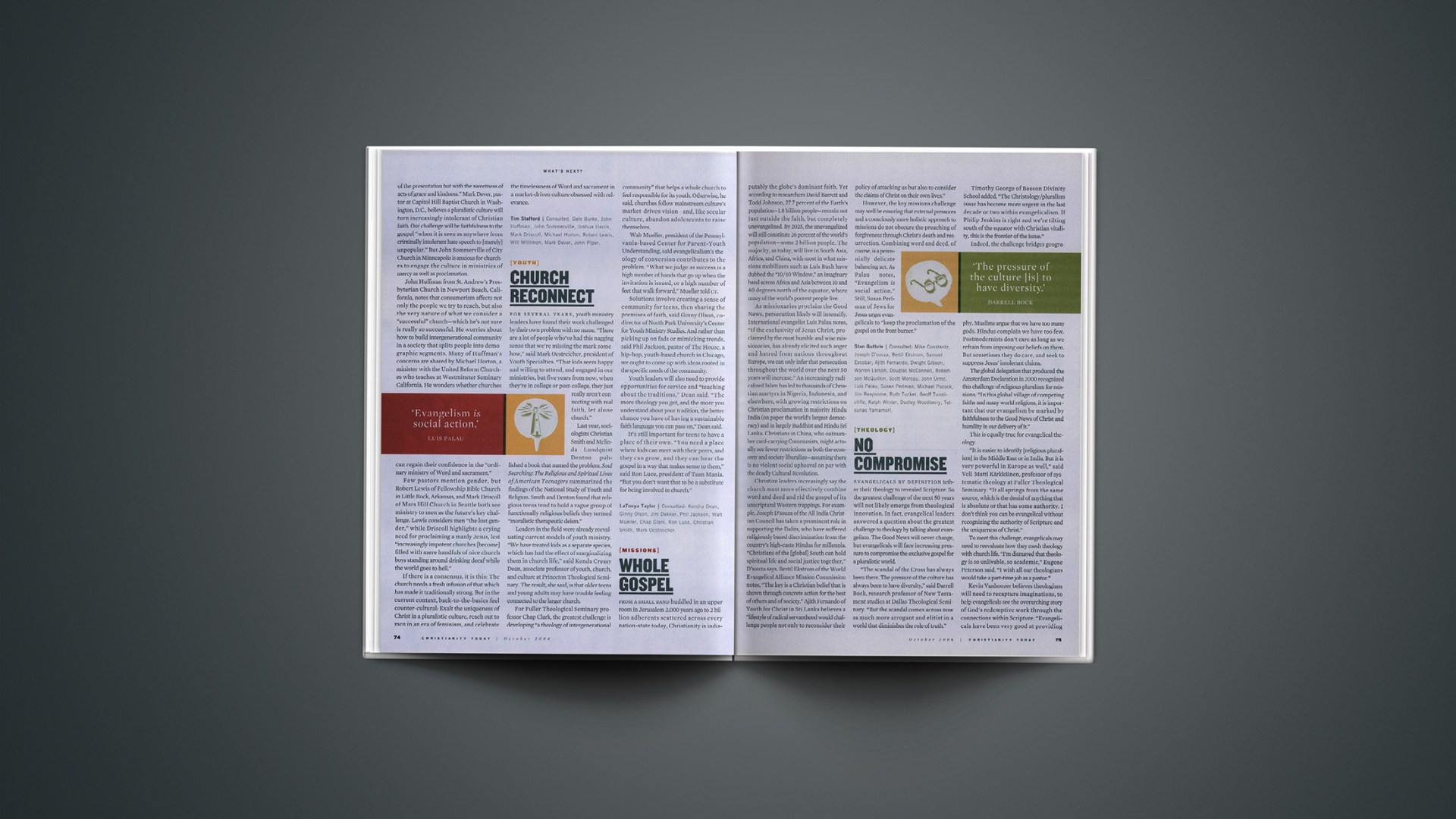We’re asked 114 leaders from 11 ministry spheres about evangelical priorities for the next 50 years. Here’s what they said about youth ministry.
For several years, youth ministry leaders have found their work challenged by their own problem with no name. “There are a lot of people who’ve had this nagging sense that we’re missing the mark somehow,” said Mark Oestreicher, president of Youth Specialties. “That kids seem happy and willing to attend, and engaged in our ministries, but five years from now, when they’re in college or post-college, they just really aren’t connecting with real faith, let alone church.”
Last year, sociologists Christian Smith and Melinda Lundquist Denton published a book that named the problem. Soul Searching: The Religious and Spiritual Lives of American Teenagers summarized the findings of the National Study of Youth and Religion. Smith and Denton found that religious teens tend to hold a vague group of functionally religious beliefs they termed “moralistic therapeutic deism.”
Leaders in the field were already reevaluating current models of youth ministry. “We have treated kids as a separate species, which has had the effect of marginalizing them in church life,” said Kenda Creasy Dean, associate professor of youth, church, and culture at Princeton Theological Seminary. The result, she said, is that older teens and young adults may have trouble feeling connected to the larger church.
For Fuller Theological Seminary professor Chap Clark, the greatest challenge is developing “a theology of intergenerational community” that helps a whole church to feel responsible for its youth. Otherwise, he said, churches follow mainstream culture’s market-driven vision—and, like secular culture, abandon adolescents to raise themselves.
Walt Mueller, president of the Pennsylvania-based Center for Parent-Youth Understanding, said evangelicalism’s theology of conversion contributes to the problem. “What we judge as success is a high number of hands that go up when the invitation is issued, or a high number of feet that walk forward,” Mueller told CT.
Solutions involve creating a sense of community for teens, then sharing the premises of faith, said Ginny Olson, co-director of North Park University’s Center for Youth Ministry Studies. And rather than picking up on fads or mimicking trends, said Phil Jackson, pastor of The House, a hip-hop, youth-based church in Chicago, we ought to come up with ideas rooted in the specific needs of the community.
Youth leaders will also need to provide opportunities for service and “teaching about the traditions,” Dean said. “The more theology you get, and the more you understand about your tradition, the better chance you have of having a sustainable faith language you can pass on,” Dean said.
It’s still important for teens to have a place of their own. “You need a place where kids can meet with their peers, and they can grow, and they can hear the gospel in a way that makes sense to them,” said Ron Luce, president of Teen Mania. “But you don’t want that to be a substitute for being involved in church.”
LaTonya Taylor | Consulted: Kenda Dean, Ginny Olson, Jim Dekker, Phil Jackson, Walt Mueller, Chap Clark, Ron Luce, Christian Smith, Mark Oestreicher.
Copyright © 2006 Christianity Today. Click for reprint information.
Related Elsewhere:
Yesterday: Local Church | Tomorrow: Politics
More Christianity Today coverage of youth is available in our full coverage area.
In the next two weeks, we’ll be looking at what evangelical leaders think are the priorities for the next 50 years in 11 categories: local church, missions, politics, publishing/broadcasting, theology, culture, evangelism, higher education, international justice and relief and development.
Christianity Today‘s other articles on its 50th anniversary include:
Where We Are and How We Got Here | 50 years ago, evangelicals were a sideshow of American culture. Since then, it’s been a long, strange trip. Here’s a look at the influences that shaped the movement. By Mark A. Noll (Sept. 29, 2006)
Sidebar: ‘Truth from the Evangelical Viewpoint’ | What Christianity Today meant to the movement 50 years ago. (Sept. 29, 2006)










